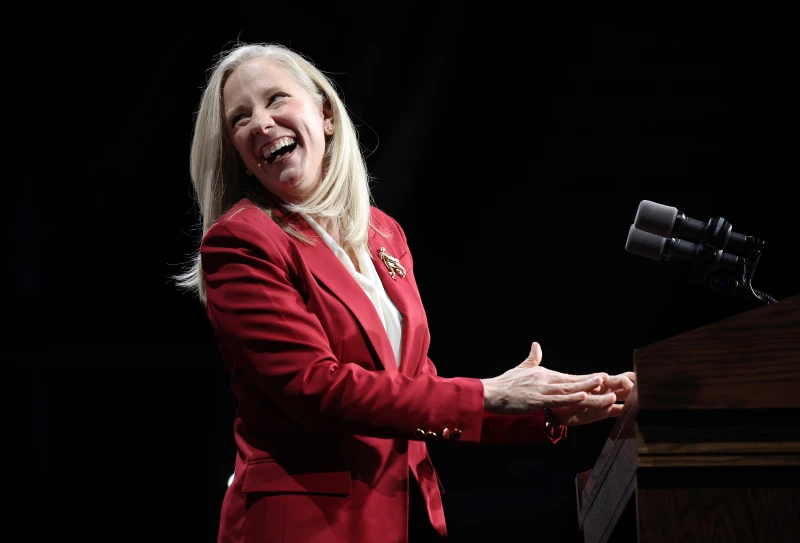
Virginia Democratic gubernatorial candidate, former Rep. Abigail Spanberger delivers remarks during her election night rally at the Greater Richmond Convention Center on Nov. 4, 2025, in Richmond, Virginia. / Credit: Win McNamee/Getty Images
CNA Staff, Nov 4, 2025 / 22:17 pm (CNA).
Off-year elections for state leadership roles in Virginia and New Jersey saw Democrats win key races in what pundits had predicted would be a referendum against Republican President Donald Trump’s second term in the White House.
Former U.S. Rep. Abigail Spanberger, D-Virginia, won the gubernatorial race in that state against current Lt. Gov. Winsome Earle-Sears to become the commonwealth’s first woman governor, according to the Associated Press, while state Sen. Ghazala Hashmi won the race for lieutenant governor there. Democrat Jay Jones also won the state’s attorney general race, beating incumbent Jason Miyares.
In New Jersey, meanwhile, Democrat Mikie Sherrill beat Republican Jack Ciattarelli, with Sherrill keeping the governor’s chair in Democratic control and becoming the second woman to lead the state government.
The results will likely be hailed as a rebuke against Trump’s second term in office, which over the course of 2025 has been marked by aggressive policy on immigration, LGBT issues, and other hot-button political topics.
Virginia race marked by abortion, conscience rights, violent rhetoric
In Virginia, the race between Spanberger and Earle-Sears was overshadowed in its last month by resurfaced text messages from Jones, dating from 2022, in which he suggested that then-state Speaker of the House Todd Gilbert, a Republican, should be shot in the head. Jones at the time also indicated a wish for Gilbert’s children to die.
The explosive texts, which were published at National Review in October, led Spanberger and Hashmi to condemn Jones, though neither they nor any major Democrats called for Jones to drop out of the race. Jones himself apologized for the remarks.
Earle-Sears repeatedly called for Jones to back out of the contest. At the election’s only gubernatorial debate on Oct. 9, she pressed Spanberger on Jones’ texts, demanding that the Democrat call for Jones’ withdrawal from the race.
Spanberger, meanwhile, made abortion access a central part of her campaign, calling on voters to elect her in order to protect Virginia’s permissive abortion laws. The Democrat has voiced support for a state constitutional amendment protecting abortion, something to which Earle-Sears has publicly voiced her opposition.
The state’s Catholic bishops had warned in October that the results of the state’s elections could lead to that amendment’s being advanced and codified into law, with this year’s winners poised to “decide whether the proposed amendments are advanced or stopped.”
In August, meanwhile, a resurfaced video from 2018 showed Spanberger apparently endorsing the policy of forcing religious hospitals to opt out of performing procedures such as abortion and euthanasia.
“I oppose the ability of religious institutions to put their religious-based ideas on individuals and their health care choices and options,” she said at the time.
Earle-Sears has expressed support for conscience rights, meanwhile, and during the October debate she indicated support for allowing employers to fire employees over their sexuality. “That’s not discrimination,” she said.
Abortion safe in New Jersey; candidates differ on LGBT issues
In New Jersey, the Republican and Democratic candidates for governor offered a notable agreement on abortion, with both Sherrill and Ciattarelli stating their desire to keep the procedure legal.
The two differed on specific policy: Ciattarelli had advocated restricting abortion after 20 weeks, while Sherrill said she favored the state’s current laws, which allow for abortion up until birth.
But their broader agreement on the legality of abortion underscored the state’s high levels of pro-abortion support among voters and indicated that the issue remains a lightning rod for Republicans even more than three years after the Supreme Court repealed Roe v. Wade.
Elsewhere, the candidates differed on LGBT issues. Ciattarelli had called for men who believe they are women to be barred from women’s sports, while Sherrill voted against federal legislation that would have barred men from competing in girls’ sporting leagues.
The Republican had also advocated rolling back pro-LGBT curriculums in public schools. Sherrill, in contrast, had voted against a federal bill that would have required schools to inform parents if their children began identifying as the opposite sex at school.
Ciattarelli had also called for a state school voucher program modeled after Florida’s successful voucher initiative. Such a measure would “allow parents real choices in the schools their children attend,” he said ahead of the election.
In October, the state’s bishops affirmed the Church’s teaching on the electoral process by telling the faithful that it is “not the Church’s place to tell them how to vote.”
“Each of us has the right — and the responsibility — to follow our conscience, shaped by Scripture and the Church’s wisdom,” the bishops said.















